Instruction on the Feast of All Saints
November 1st
Why has the Church instituted this festival?
1. To give praise to God in His saints, (Ps. cl.) and to pay to the saints themselves the honor which they merit for having made it the work of their earthly life to promote the honor of God.
2. To impress vividly upon our minds that we are members of that holy Catholic Church which believes in the communion of saints, that is, in the communion of all true Christians, who belong to the Church triumphant in heaven, to the Church suffering in purgatory, or to the Church militant upon earth; but, more particularly, to cause us earnestly to consider the communion of the saints in heaven with us, who are yet battling on earth.
3. To exhort us to raise our eyes and hearts, especially on this day, to heaven, where before the throne of God is gathered the innumerable multitude of saints of all countries, times, nationalities and ranks of life, who have faithfully followed Christ and left us glorious examples of virtues, which we ought to imitate. This we can do, for the saints, too, were weak men, who fought and conquered only by the grace of God, which will not be denied to us.
4. To honor those saints, for whom during the year there is no special festival appointed by the Church. Finally, that in consideration of so many intercessors God may grant us perfect reconciliation, may permit us to share in their merits, and may grant us the grace to enjoy with them, one day, the bliss of heaven.
Who first instituted this festival?
Pope Boniface IV. first suggested the celebration of this festival, when in 610 he ordered that the Pantheon, a pagan temple at Rome, dedicated to all the gods, should be converted into a Christian church, and the relics of the saints, dispersed through the different Roman cemeteries, taken up and placed therein. He then dedicated the Church to the honor of the Blessed Virgin and all the martyrs, and thus for the first time celebrated the Festival of All Saints, directing that it should be observed in Rome every year.
Pope Gregory IV. extended this feast to the whole Catholic Church, and appointed the 1st of November as the day of its celebration.
At the Introit the Church sings: "Let us all rejoice in the Lord, celebrating a festival day in honor of all the saints; at whose solemnity the angels rejoice, and give praise to the Son of God. Rejoice in the Lord, ye just: praise becometh the upright. Glory Be, etc.
PRAYER OF THE CHURCH. Almighty everlasting God, who givest us to venerate in one solemnity the merits of all Thy saints: we beseech Thee to bestow upon us, through our multiplied intercessors, the fulness of Thy propitiation. Through Our Lord Jesus Christ Thy Son, Who livest and reignest with Thee in union with the Holy Ghost, now and forever. Amen.
LESSON. (Apoc. vii. 2 12.) IN THOSE DAYS, behold, I, John, saw another angel ascending from the rising of the sun, having the sign of the living God: and he cried with a loud voice to the four angels, to whom it was given to hurt the earth and the sea, saying: Hurt not the earth, nor the sea, nor the trees, till we sign the servants of our God in their foreheads. And I heard the number of them that were signed, and hundred and forty-four thousand were signed, of every tribe of the children of Israel. Of the tribe of Juda were twelve thousand signed. Of the tribe of Ruben twelve thousand signed. Of the tribe of Gad twelve thousand signed. Of the tribe of Aser twelve thousand signed. Of the tribe of Nephtali twelve thousand signed. Of the tribe of Manasses twelve thousand signed. Of the tribe of Simeon twelve thousand signed. Of the tribe of Levi twelve thousand signed. Of the tribe of Issachar twelve thousand signed. Of the tribe of Zabulon twelve thousand signed. Of the tribe of Joseph twelve thousand signed. Of the tribe of Benjamin twelve thousand signed. After this I saw a great multitude which no man could number, of all nations, and tribes, and peoples, and tongues, standing before the throne and in sight of the Lamb , clothed with white robes , and palms in their hands: and they cried with a loud voice, saying: Salvation to our God who sitteth upon the throne, and to the Lamb. And all the angels stood round about the throne, and the ancients, and the four living creatures; and they fell down before the throne upon their faces, and adored God, saying: Amen. Benediction, and glory, and wisdom, and thanksgiving, honor, and power, and strength to our God for ever and ever. Amen.
EXPLANATION:
The words of this lesson relate immediately to the divine punishment on Jerusalem and the Jewish people, as they were revealed in spirit to John; in a higher and particular sense they refer to the general judgment. At this judgment there will be chosen ones, from each of the twelve tribes of Israel. But that it might not be thought that the elect are principally Christian converts from Judaism, St. John was shown a countless multitude of Christians from heathen lands, by which it is seen, that it is the pagans who will principally fill the Church of Christ and heaven. This multitude clothed in white and carrying palms in their hands, stand before the throne of God and before the Lamb, that is, Christ. The white robes are tokens of their innocence; the palm is the emblem of their glory and of their victory over the temptations of the world, the flesh and the devil. They shall adore God, and forever sing to Him, in communion with all the heavenly spirits, a canticle of praise for the power and glory which He has bestowed upon them.
Let us strive so to live, that we may one day be among these chosen ones.
GOSPEL. (Matt. v. i 12.)
AT THAT TIME, Jesus seeing the multitudes, went up into a mountain. And when he was sat down, his disciples came unto him. And opening his mouth, he taught them, saying: Blessed are the poor in spirit, for theirs is the kingdom of heaven. Blessed are the meek, for they shall possess the land. Blessed' are they that mourn, for they shall be comforted. Blessed are they that hunger and thirst after justice, for they shall have their fill. Blessed are the merciful, for they shall obtain mercy. Blessed are the clean of heart, for they shall see God. Blessed are the peace-makers, for they shall be called the children of God. Blessed are they that suffer persecution for justice' sake, for theirs is the kingdom of heaven. Blessed are ye when they shall revile you, and persecute you, and speak all that is evil against you untruly, for my sake: be glad and rejoice, for your reward is very great in heaven.
Why is the Gospel of the Eight Beatitudes read on this day?
Because they form, so to speak, the steps on which the saints courageously ascended to heaven. If you desire to be with the saints in heaven, you must also mount patiently and perseveringly these steps, then God's hand will assuredly aid you.
EXPLANATION OF THE EIGHT BEATITUDES.
1. Blessed are the poor in spirit, for theirs is the kingdom of heaven.
THEY are poor in spirit who, like the apostles, leave all temporal things for Christ's sake and become poor; they who have lost their property by misfortune or injustice, and bear this loss with patience and resignation to the will of God; they who are contented with their poor and lowly station in life, do not strive for greater fortune or a higher position, and would rather suffer want than make themselves rich by unlawful means; they who though rich do not love wealth, nor set their hearts upon it, but use their riches to aid the poor; and especially they who are humble, that is, who have no exalted opinion of themselves, but are convinced of their weakness and inward poverty, have a low estimate of themselves, therefore, feel always their need, and like poor mendicants, continually implore God's grace and assistance.
2. Blessed are the meek, for they shall possess the land. He is meek who represses every rising impulse of anger, impatience and desire of revenge, and willingly puts up with every thing that God, td prove him, decrees or permits to happen to him, or men inflict upon him. He who thus controls himself, is like a calm and tranquil sea, in which the image of the divine Sun is ever reflected, clear and unruffled. He who thus conquers himself is mightier than
if he besieged and conquered strongly fortified cities, (Prov. xvi. 32.) and will without doubt receive this earth, as well as heaven, as an inheritance, enjoying eternally there the peace (Ps. xxxvi. n.) which is already his on earth.
3. Blessed are they that mourn , for they shall be comforted. The mourners here mentioned are not those who weep and lament over the death of relatives and friends, or over misfortune or loss of temporal riches, but those who mourn that God is so often offended, so little loved and honored by men, that so many souls, redeemed by the precious blood of Christ, are lost. Among these mourners are also those who lead a strict and penitential life, and patiently endure distress; for sin is the only evil, the only thing to be lamented, and those tears only, which are shed on account of sin, are useful tears, and are recompensed by everlasting joy and eternal consolation.
4. Blessed are they that hunger and thirst after justice, for they shall have their fill. Hunger and thirst denote the ardent longing for those virtues which constitute Christian perfection. He who seeks such perfection with ardent desire and earnest striving, will be filled, that is, will be adorned by God with the most beautiful virtues, and will be abundantly rewarded in heaven.
5. Blessed are the merciful, for they shall obtain mercy. They are merciful who assist the poor according to their means, who practice every possible spiritual and corporal work of mercy, who as far as they can, patiently endure the faults of others, strive always to excuse them, and willingly forgive the injuries they have received. They especially are truly merciful, who are merciful to their enemies, and do good to them, as written: Love your enemies, and do good to them that hate you. (Matt. v. 44.) Well is it for him who is merciful, the greatest rewards are promised him, but a judgment without mercy shall be passed on the unmerciful.
6. Blessed are the clean of heart, for they shall see God. They are clean of heart, who carefully preserve the innocence which they received in baptism, and keep their heart and conscience free not only from all sinful words and deeds, but from all sinful thoughts and desires, and in all their omissions and commissions think and desire only good. These while yet on earth see God in all His works and creatures, because their thoughts are directed always to the Highest Good, and in the other world they will see Him face to face, enjoying in this contemplation a peculiar pleasure which is reserved for pure souls only; for as the eye that would see well, must be clear, so must those souls be immaculate who are to see God.
7. Blessed are the peace-makers, for they shall be called the children of God. Those are peace-makers who guard their improper desires who are careful to have peace in their conscience and regulated tranquility in all their actions, who do not
quarrel with their neighbors, and are submissive to the will of God. These are called children of God, because they follow God who is a God of peace, (Rom. xv. 33.) and who even gave His only Son to reconcile the world, and bring upon earth that peace which the world does not know and cannot give.(Luke ii. 14.; John xiv. 27.)
8. Blessed are they that suffer perseciition for justice' sake, for theirs is the kingdom of heaven. Those suffer persecution for justice' sake who by their words, writings, or by their life defend the truth, the faith and Christian virtues; who cling firmly to God, and permit nothing to turn them from the duties of the Christian profession, from the practice of their holy religion, but on its account suffer hatred, contempt, disgrace, injury and injustice from the world. If they endure all this with patience and perseverance, even, like the saints, with joy, then they will become like the saints and like them receive the heavenly crown. If we wish to be crowned with them, we must suffer with them: And all that will live godly in Christ Jesus, shall suffer persecution, (ii. Tim. v 111, 12.)
SUPPLICATION.
How lovely, O Lord, are Thy tabernacles! My soul longeth for Thy courts. My body and soul rejoice in Thee, most loving God, Thou crown and reward of all the saints, whose temporal pains and sufferings Thou dost reward with eternal joy, filling them with good! How blessed are they who have faithfully served Thee, for they carry Thy name on their forehead, and reign with Thee for all eternity.
Grant us, we beseech Thee, O God, by their intercession, Thy grace that we, after their example, may serve Thee in sanctity and justice, in poverty and humility, in meekness and repentance, in the ardent desire for all virtues, by mercy, perfect purity of heart, in peacefulness and patience, following them, and taking part, one day, with them in heavenly joy and happiness. Amen.
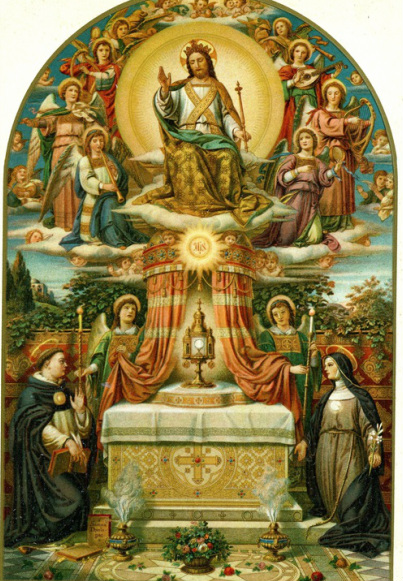

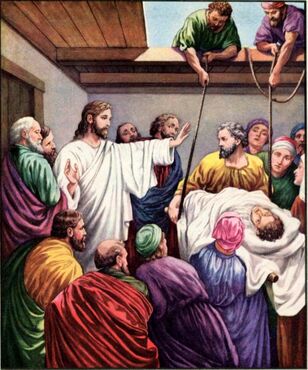
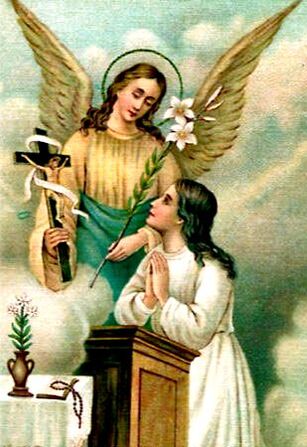
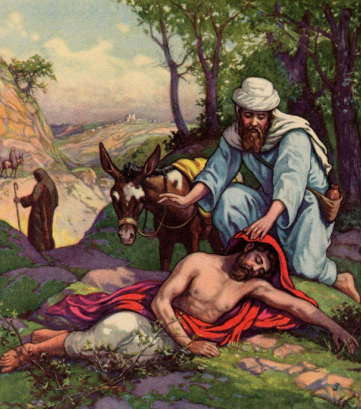
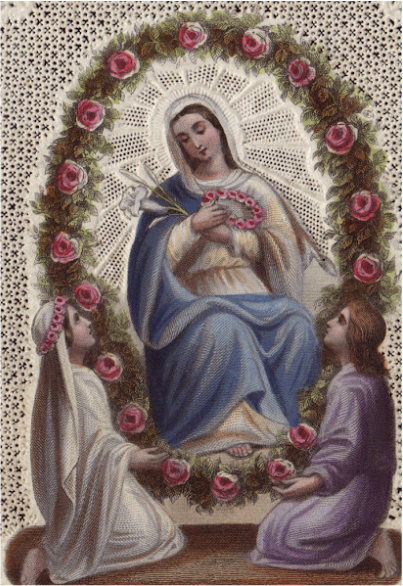
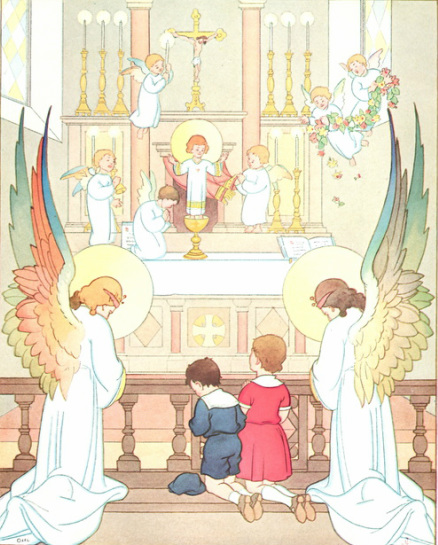


 RSS Feed
RSS Feed